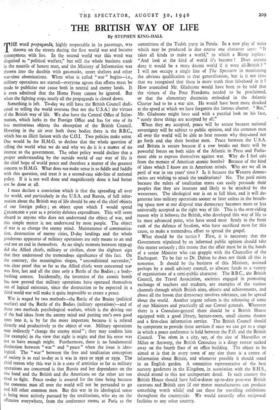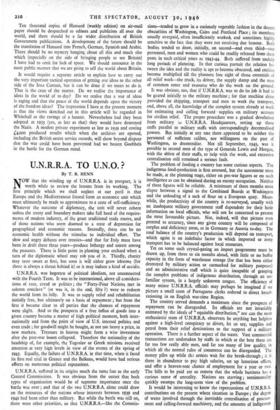THE BRITISH WAY OF LIFE
THE word propaganda, highly respectable in its parentage, was thrown on the streets during the first world war and became synonymous with lies. In the second world war this word was disguised as "political warfare," but still the whole business stank in the nostrils of honest men, and the Ministry of Information was thrown into the dustbin with gas-masks, street shelters and other war-time abominations. When what is called " war " begins—i.e., military operations are started—everyone agrees that efforts must be made to publicise our cause both in neutral and enemy lands. It is even admitted that the Home Front cannot be ignored. But when the fighting stops nearly all the propaganda is closed down.
Something is left. To-day we still have the British Council dedi- cated to telling the world overseas (but not the U.S.A.) the virtues of the British way of life. We also have the Central Office of Infor- mation, which lurks in the Foreign Office and has for one of its less meritorious objects the absorption of the British Council. Hbvering in the air over both these bodies there is the B.B.C., which has an illicit liaison with the C.O.I. Two policies make sense. One would be for H.M.G. to declare that the whole question of telling the world what we do and why we do it is a matter of no interest to the government. The other policy would declare that a proper understanding by the outside world of our way of life is the chief hope of world peace and therefore a matter of the greatest concern to H.M.G. What does not make sense is to fiddle and fuddle with this question, and treat it as a second-rate side-line of national policy. If it is not well done and magnificently done it had better not be done at all.
I must declare a conviction which is that the spreading all over the world, and particularly in the U.S:A. and Russia, of full infor- mation about the British way of life should be one of the chief objects of our foreign policy ; an object upon which I would spend L50,000,000 a year as a priority defence expenditure. This will seem absurd to anyone who does not understand the object of war, and this simple matter is not understood by most people. The object of war is to change the enemy mind. Maintenance of communica- tion, destruction of enemy cities, D-day landings and the whole ponderous apparatus of military operations are only means to an end and not an end in themselves. At no single moment between 1939-45 did the Allied chiefs, military or civilian, show the slightest sign that they understood the tremendous significance of this fact. On the contrary, the meaningless slogan, "unconditional surrender," was clear proof that so far as the Allied chiefs were concerned war was first, last and all the time only a Battle of the Bodies ; a body- bashing contest. Incidentally, the invention of the atomic bomb has now proved that military operations have operated themselves out of logical existence, since the destruction to be expected in a third world war will make it quite impossible to create a peace.
War is waged by two methods—the Battle of the Brains (political warfare) and the Battle. of the Bodies (military operations)—and of these two methods psychological warfare, which is the driving out of the bad ideas from the enemy mind and putting one's own good ones into it, is by far the more important because it is related directly and productively to the object of war. Military operations may indirectly "change the enemy mind " ; they may confirm him (for example) in the view that right is might and that his error was not to have enough might. Furthermore, there is no fundamental distinction between " war " and " peace " when the issue is ideo- logical. The " war " between the free and totalitarian conception of society is as real to-day as it was in 1919 Or 1936 Or 1939. The chief reason why this war is in a state of armistice so far as military operations are concerned is that Russia and her dependants on the one hand and the British and the Americans on the other are too tired to fight. Peace to-day is assured for the time being because the common man all over the world will not be persuaded to go and kill other common men. But this war, in its ideological sense is being most actively pursued by the totalitarians, who are on the offensive everywhere, from the conference rooms at Paris to the
committees of the Tudeh party in Persia. In a new play of mine which may be produced in due course one character says : "It takes all kinds to make a world," to which a Blimp replies : "And look at the kind of world it's become ! Does anyone deny it would be a more decent world if it were all-British ? " I will not occupy a single line of The Spectator in mentioning the obvious qualification to that generalisation, but is it not time that we recognised that there is more truth than falsehood in it ? How astonished Mr. Gladstone would have been to be told that the virtues of the Four Freedoms needed to be proclaimed, or that the elementary decencies embodied in the Atlantic Charter had to be a war aim. He would have been more shocked at the speed at which we have forgotten the famous charter. "But," Mr. Gladstone might have said with a puzzled look on his face, "surely these things are accepted by all."
When they are accepted, peace will be secure because national sovereignty will be subject to public opinion, and the common men all over the world will be able to hear reasons why they-need not go forth and slay their brother men. Peace between the U.S.A. and Britain is secure because if a row breaks out there will be powerful forces on both sides of the Atlantic in Press and Parlia- ment able to express themselves against war. Why do I feel safe from the menace of American atomic bombs? Because of the kind of ideas which I know are in American minds. Why are we all in peril of war in ten years' time ? Is it because the Western democ- racies are wishing to attack the totalitarians? No. The peril exists because the rulers of totalitarian states can easily persuade their peoples that they are insecure and likely to be attacked by the westerners. The ideological war is on at full blast, and it will de- generate into military operations sooner or later unless in the breath- ing space now at our disposal true democracy becomes more or less universally accepted as the right way of life. This is the over-riding reason why it behoves the British, who developed this way of life to its most advanced point, who have stood most firmly in the front rank of the defence of freedom, who have sacrificed most for this cause, to make a tremendous effort to spread the gospel.
What should be the tactics ? First, it is necessary that the Government stipulated by an informed public opinion should take this matter seriously ; this means that the affair must be in the hands of a senior Minister who can grapple with the Chancellor of the Exchequer. To be fair to Dr. Dalton he does not think all this is nonsense. It should be the business of this Minister, assisted perhaps by a small advisory council, to allocate funds to a variety of organisations of a semi-public character. The B.B.C., the British Council, the Travel Association, societies engaged in promoting exchange of teachers and students, are examples of the various channels through' which British aims, objects and achievements, and above all the lesson that democracy involves tolerance, can be spread about the world. Another urgent reform is the rehousing of some of our Ministers and practically all our Consul generals. Wherever there is a Consulate-general there should be a British House equipped with a good library, lecture-room, small cinema theatre and a first-class information service. The British Council should be competent to provide these services if once we can get to a stage in which a peace conference is held between the F.O. and the British Council. Too often in a city, say, of the size of Marseilles or Milan or Antwerp, the British Consulate is a dingy retreat tucked away on the fourth floor of an office building. The object to be aimed at is that in every town of any size there is a centre of information about Britain, and whenever possible it should stand in an English garden. A committee representative of the best nursery gardeners in the Kingdom, in association with the R.H.S., should attend to this not unimportant detail. In each country the British House should have half-a-dozen up-to-date post-war British caravans and British cars (if our motor manufacturers can produce something worth while) and use these for travelling exhibitions throughout the countryside. We would naturally offer reciprocal facilities to any other country.
Ten thousand copies of Hansard (weekly edition) on air-mail- paper should be despatched to editors and publicists all over the world, and there should be a far wider distribution of British Government publications. A development of the future should be the translation of Hansard into French, German, Spanish and Arabic. There should be no mystery hanging about all this and much else which (especially on the side of bringing people to see Britain) I have had to omit for lack of space. We should announce in the most public manner that we are going to tell the world about Britain.
It would require a separate article to explain how to carry out the very important tactical operation of getting our ideas to the other side of the Imo Curtain, but it can be done if we mean to do it. That is the crux of the matter. Do we realise the importance of ideas in the world of to day? Do we realise that a war of ideas is raging and that the peace ot the world depends upon the victory of the freedom ideas? The impression I have at the present moment is that the views sketched out in this article will be regarded in Whitehall as the ravings of a lunatic. Nevertheless had they been adopted in 1935 (yes, as late as that) they would have destroyed the Nazis. A modest private experiment as late as 1939 and costing £4,000 produced results which when the archives are opened, including the British secret service records, will show beyond dispute that the war could have been prevented had we beaten Goebbels in the battle for the German mind.



























 Previous page
Previous page